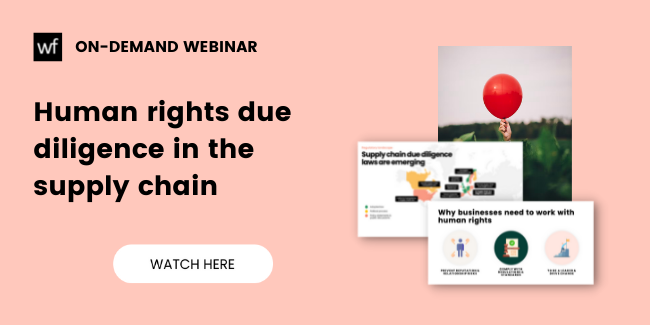Human rights due diligence - challenges, upcoming regulations and solutions

Human rights due diligence (HRDD) is a growing worldwide movement and it’s no longer optional to take responsibility for human rights. So, how can you get started working with HRDD, what are the latest updates on HRDD legislation and what are the challenges in working with human rights?
In this blog post you’ll receive the key points from our webinar covering human rights due diligence, who the new legislation affects and how you can get started working with HRDD. Get an understanding of challenges for suppliers as well as for purchasers, solutions and tips from the panelists.
What is human rights due diligence?
Human rights due diligence (HRDD) is a risk management process that businesses can implement to identify and respond to actual and potential negative impacts within their own operations and their supply chains.
Why businesses need to work with human rights
There’s an increased requirement on companies to undertake human rights due diligence (HRDD), both from stakeholders and from legislation. The need for businesses to work with human rights is more severe than ever, as new legal requirements on businesses evolve.
In addition to regulations, even customers' and investors’ demands on companies are rising, increasing the importance of working with human rights due diligence regardless if your company is legally required to do so or not. For those not working with human rights there’s a risk for reputational damage and for those who do - it’s a competitive advantage.
Why companies need to implement HRDD
-
Prevent reputation and relationship risks
-
Comply with regulations and standards
-
To be a leader and drive change
EU’s due diligence directive proposal
On February 23rd 2022, the European Commission adopted a proposal for a directive on corporate sustainability due diligence. The directive would be based on the UN’s guiding principles and OECD guidelines, introducing a corporate due diligence obligation that covers adverse human rights and environmental impacts.
The directive is proposed to apply to large companies or companies in high-impact sectors. However, even smaller companies will be affected as they’re exposed to the directive through business relationships with companies directly in the scope. The European Commission has divided the implementation of the directive in two groups.
The first group who will be affected is EU companies that:
-
have 500+ employees and
-
have 150+ million euros turnover worldwide
Two years later, the second group who will be affected are EU companies that:
-
have 250+ employees,
-
have 40+ million turnover worldwide and
-
who are operating in high impact sectors
A large number of governments are introducing their own HRDD regulations, thereamong Norway with their Transparency Act, which will enter into force July 2022, France who has had an initiative in place since 2017, Germany gradually introducing their initiative from 2023 and the Netherlands with their national HRDD law, which is likely to enter into force in 2022. The most severe difference between the EUs’ and national legislations are the size of the scope of which companies that’s directly affected.
What is the purpose of the EU due diligence directive?
-
By having one law, social and environmental interests will be fully embed into business strategies
-
Having one law for all member states, legal certainty will increase
-
Increasing corporate accountability
-
Improving access to remedy for victims
-
Complementing other regulations such as the EU taxonomy and the SFDR
6 steps for implementing the OECD due diligence procedure
1. Policy commitment
Develop, implement and communicate a policy on human rights due diligence. Incorporate these policies and expectations in business relationships.
2. Process to identify risk
Develop a process to assess and identify the most significant risks within operations, suppliers and business relationships.
3. Act and provide remedy
Take action on the most significant risks to then develop a remediation plan to cease, prevent and mitigate risks
4. Track and review results
Track the implementation and results to evaluate the effectiveness of due diligence procedures. Through this you can make continuous improvements.
5. Communicate publicly
Communicate human rights due diligence procedures, risks, activities, and findings to stakeholders
6. Cooperate for remedy
Cooperate with other parties to enable remedy for victims and provide grievance mechanisms such as whistleblower systems.
Key takeaways from the discussion
A common challenge that was discussed was the increasing reporting burden which many suppliers feel, along with the collection of data. An issue that came up is the survey-fatigue that suppliers suffer from as they are to respond to many surveys from many purchasers.
Another topic that was discussed was the importance of focusing on your suppliers where there’s the most severe risks. By focusing on suppliers where you know attention is needed, you can mitigate the overall risk in your supply chain and minimize the margin for error.
Get started with HRDD (tips from the panel)
If you’re just getting started with HRDD, we’ve pinpointed some of our panelists best tips for you:
Start slow
If you start by looking into too many suppliers at the same time, you might feel overwhelmed. Instead - look at the suppliers that you already know you have some risks to deal with and start there.
You don’t have to reinvent the wheel
There are many good initiatives where you can learn from others, look at what others have done and get inspired. By getting help with starting your HRDD work, you can get a head start and move more rapidly. Worldfavor can help you automate your OECD-aligned human rights risk assessment to monitor risks more accurately, faster and according to current and upcoming legislation.
Worldfavor assist you in your risk assessment
The report burden problem is the mission behind why Worldfavor exists. Our platform enables suppliers to share their information once to all stakeholders and make it available to all its customers, making it easy to share and access sustainability data.
As for you in procurement, Worldfavor’s risk assessment allows you to find out if your suppliers have an extreme, high, medium, or low country risk of human rights. In addition, you can collect data from your suppliers to find out what policies and processes they have in place to mitigate risks. This helps you find which suppliers you should put extra focus on and where additional action is needed.
Related blogs you might like:






%20as%20the%20deadline%20approaches.%20Learn%20about%20compliance%20requirements%2c%20potential%20delays%2c%20and%20key%20updates..png)

